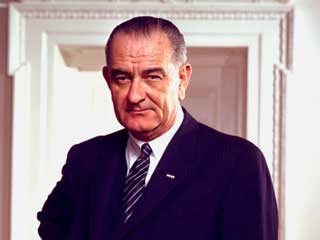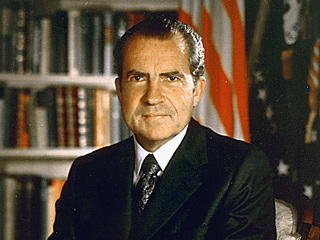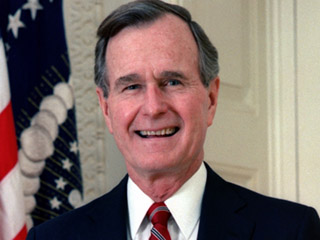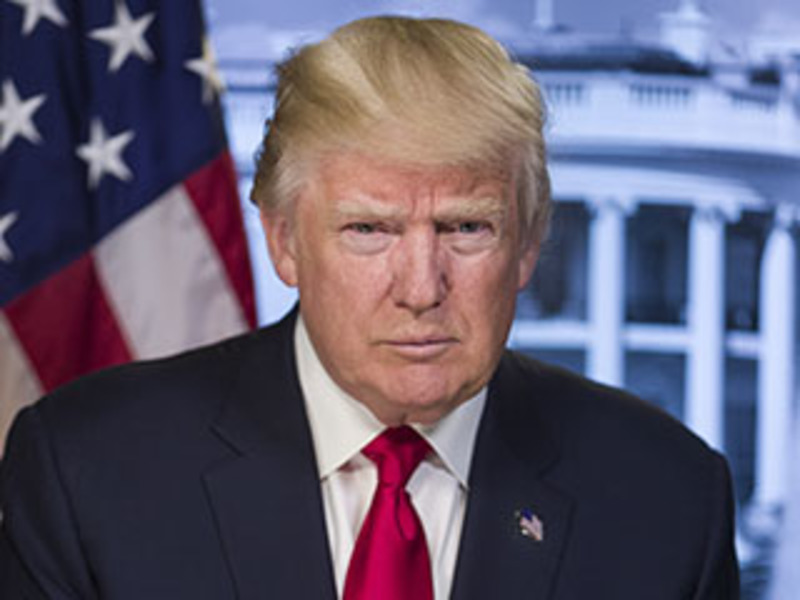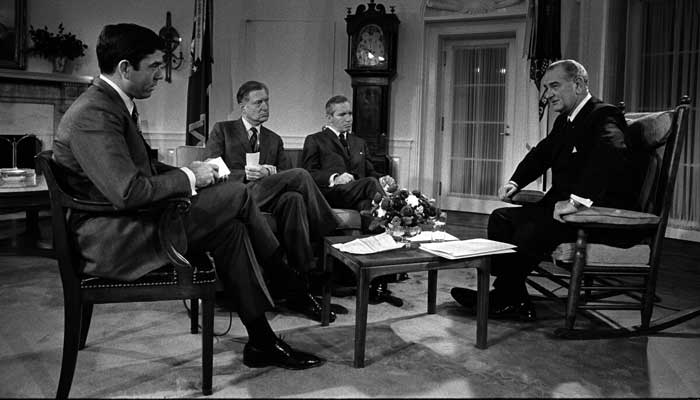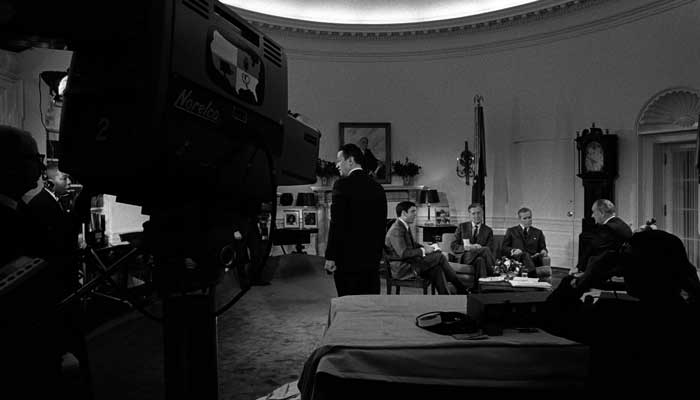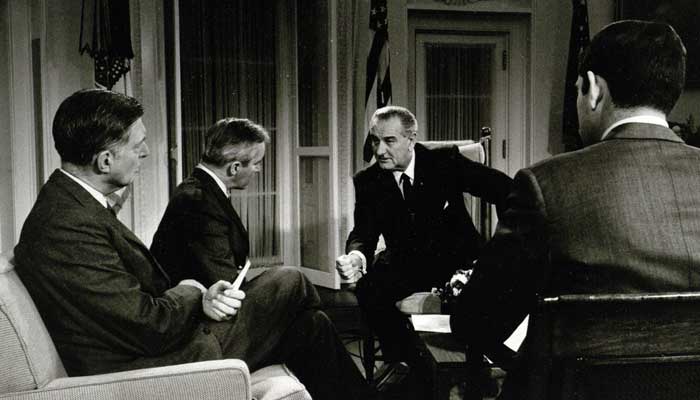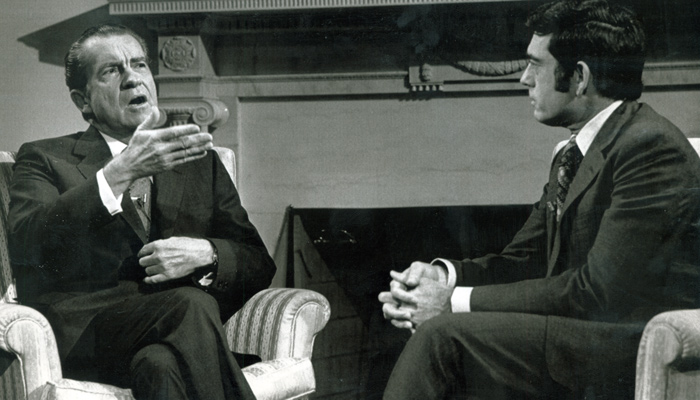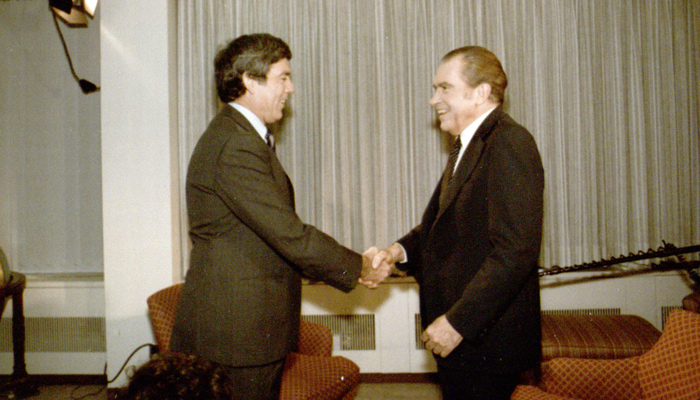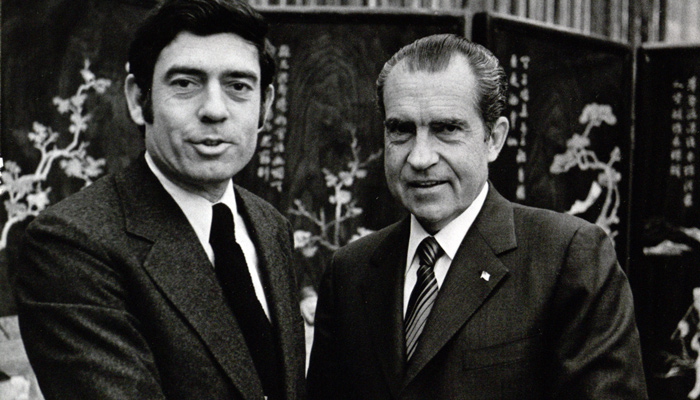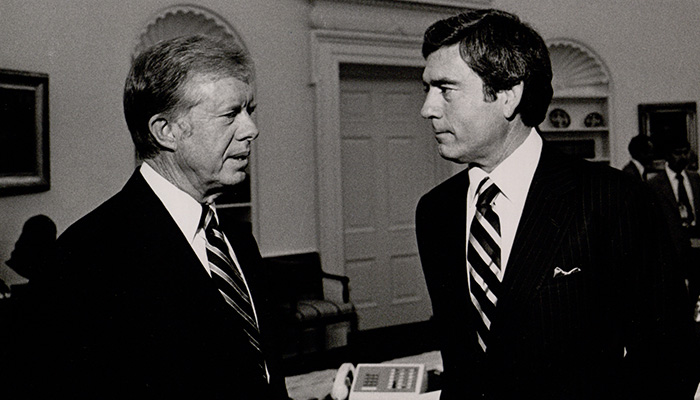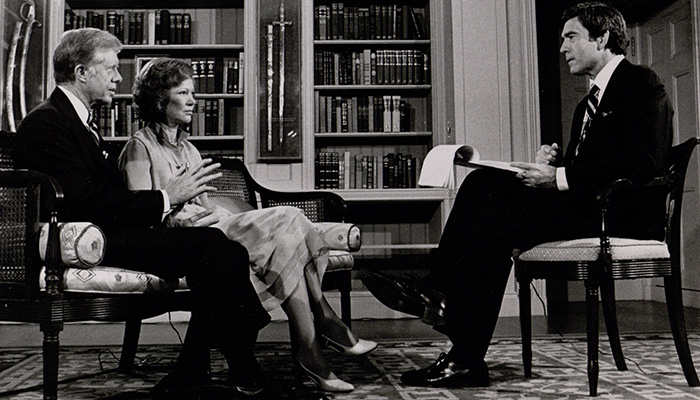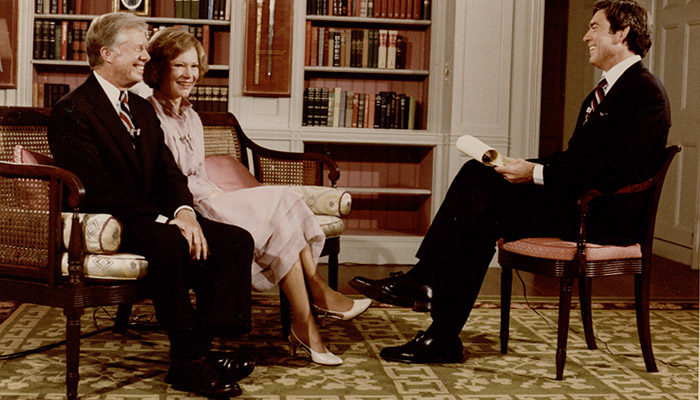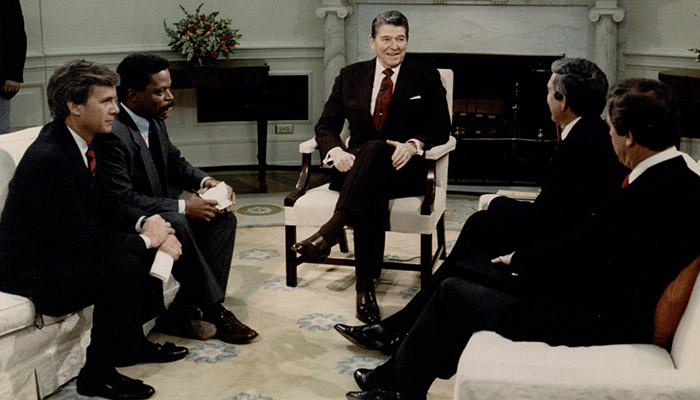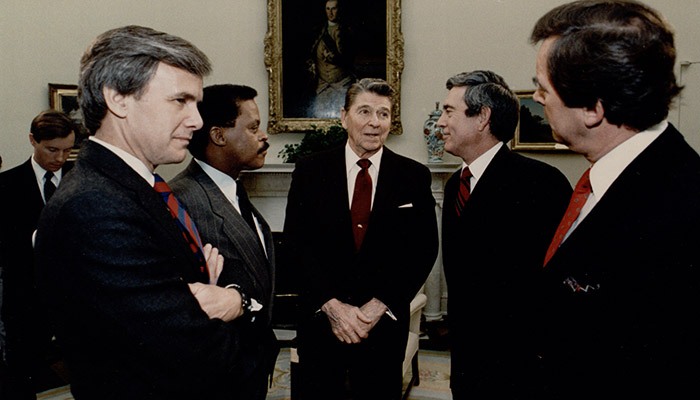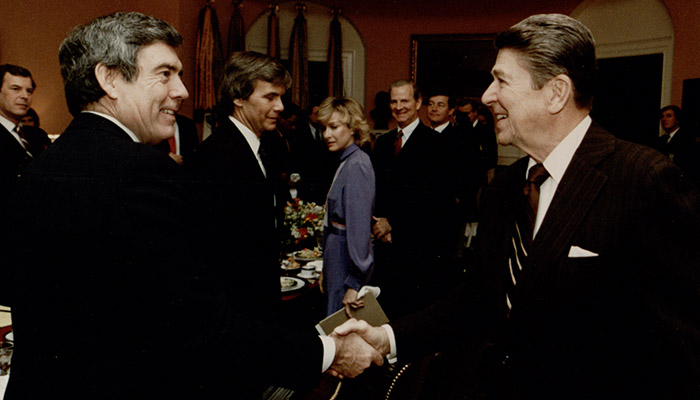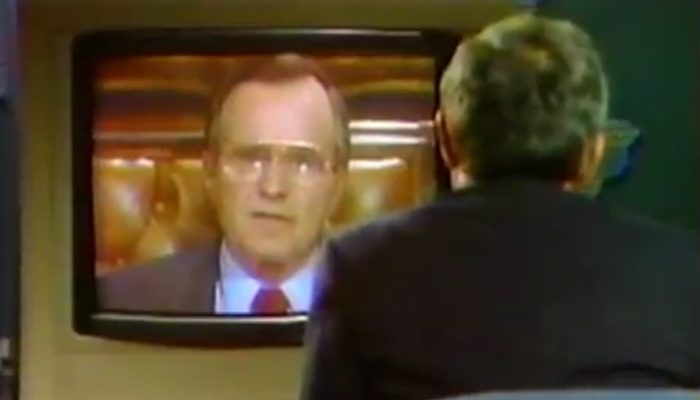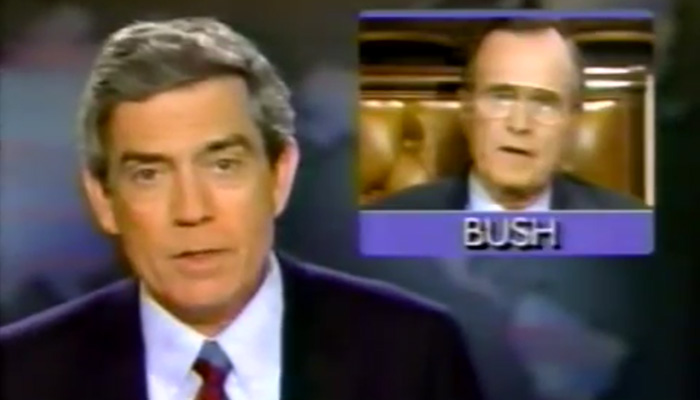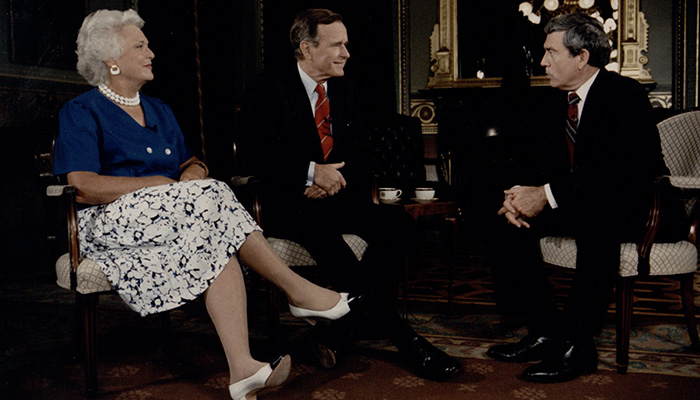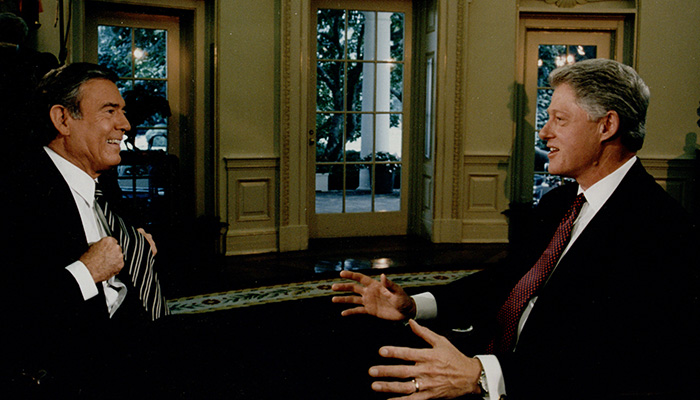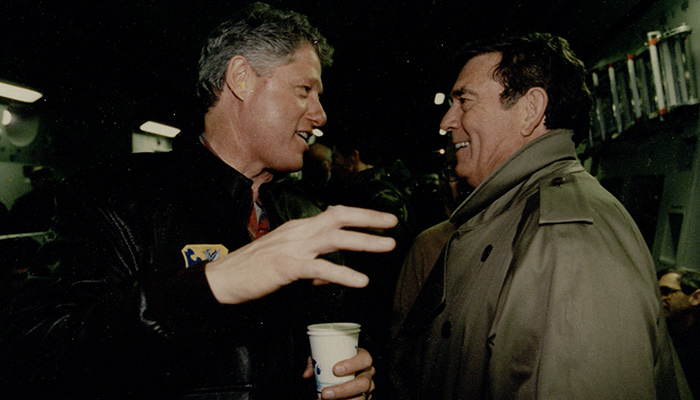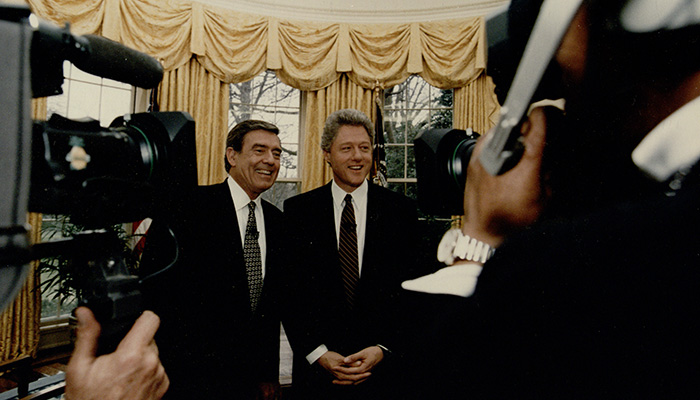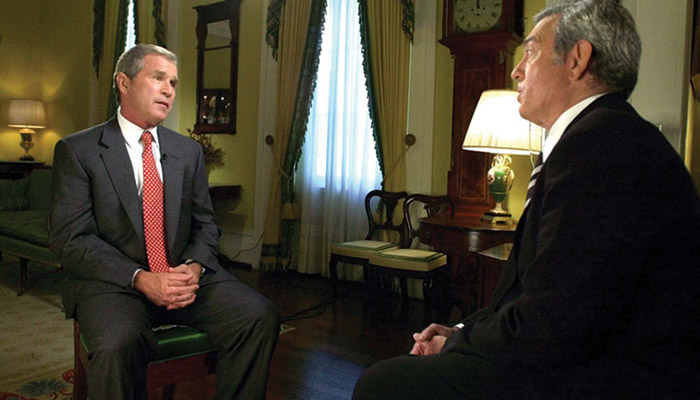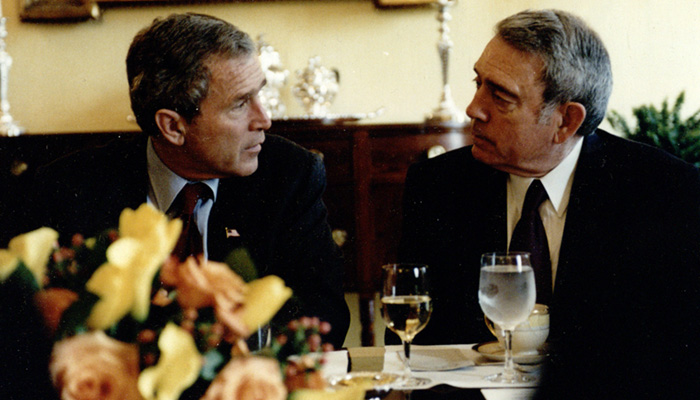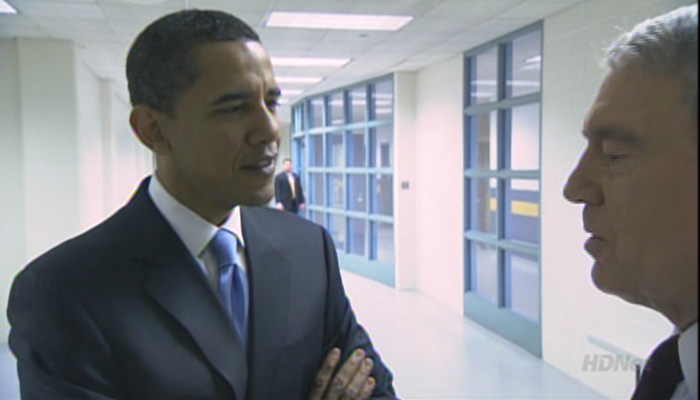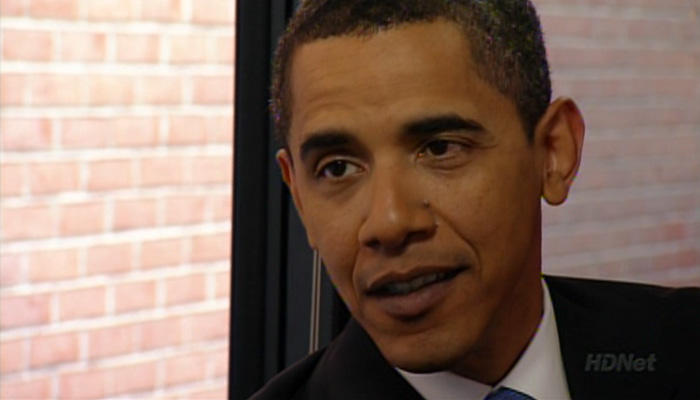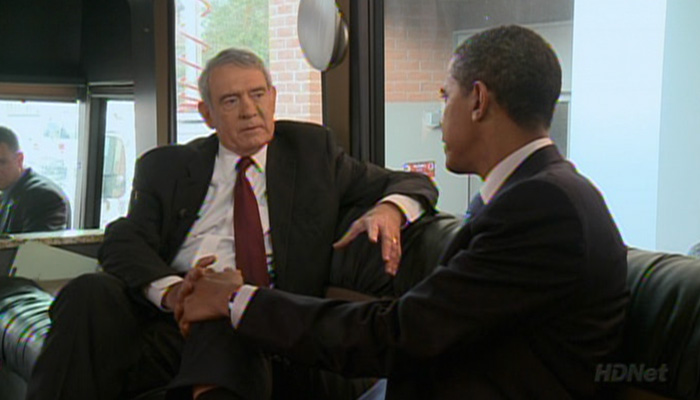As developed in our Political Analyst section, Dan Rather has covered every president since Eisenhower and asked them questions as a reporter, a White House correspondent, and as anchor for the CBS Evening News. In the course of his career, he also sat for lengthy interviews with candidates and sitting presidents, alone or with other leading journalists, and these "conversations" allowed for more in-depth interviews. His major interviews as well as materials about his work on individual administrations are featured in this section.
Lyndon B. Johnson
As a White House correspondent, Dan Rather talked numerous times with President Johnson, accompanying him on overseas trips and regularly meeting him with other members of the press at the LBJ Ranch. In December 1967, President Johnson agreed to an hour-long interview with the three national television networks. "A Conversation with the President" was taped in Johnson's office with Frank Reynolds (ABC), Dan Rather (CBS), and Ray Scherer (NBC), and it was carried simultaneously by the three networks at 10 p.m on December 19, 1967. The president answered questions about foreign policy, with Vietnam, the Soviet Union, Israel, France, and China all being discussed. He discussed the youth of the nation, among them dissenters and antiwar demonstrators, and programs he planned to prioritize in 1968. Johnson also talked about domestic riots, the upcoming 1968 election, and the role of television.
Materials
Richard Nixon
On January 2, 1972, Dan Rather sat down with Nixon for a highly anticipated “Conversation with the President,” as the president had not talked to the press in over seven weeks. Much of the discussion focused on Vietnam. Nixon mentioned a possible faster withdrawal of U.S. troops after a recent wave of bombing raids, which he defended as “very effective,” and he talked about the issues of POWs and the thousands of Americans who had fled the country rather than be drafted. In regard to domestic affairs, the president acknowledged that some of the wage and price controls instated in 1971 might have to remain in place. He hinted strongly that he would run again for election with Agnew as his running mate, and he sidestepped the issue of the potential candidacy of Governor George Wallace.
Both men prepared intensely—Nixon spent the day “war gaming” in his executive office and Rather collected over 500 questions and worked with producer Tom Bettag to prepare. The New York Times described Rather as “a good reporter, prepared with sharp questions and pertinent notes on index cards.” As reported by network officials, two-third of all callers “approved of the tone and content of the questioning, which was gentlemanly but firm.” President Nixon who had “exhibited a lively and knowledgeable interest in the technical arrangements” seemed pleased with the outcome. The request by the Democratic National Committee for equal time response under the provision of the Communication Act was eventually denied.
Materials
Jimmy Carter
In the late 1970s, Dan Rather interviewed several members of the Carter family: in 1976, he talked to Chip Carter as he was campaigning for his father for the November election. For the CBS interview show Who’s Who, Rather then interviewed Jimmy Carter's brother Billy Carter and First Lady Rosalynn Carter, in January and April 1977, respectively. In August 1980, Rather sat with both President Carter and the First Lady for a one-hour interview for 60 Minutes. As Broadcasting reported, CBS had originally planned to run this special interview during the Democratic National Convention, in the same way that they had aired Mike Wallace's interview with Ronald Reagan during the Republican National Convention a month earlier. Expecting a volatile first day at the convention, the network decided instead to run the interview during the regular 60 Minutes slot on Sunday evening. Major topics of discussions were the upcoming elections and Carter's opponents; the U.S. hostage situation in Iran; Carter's economic plan; tensions in Afghanistan and Cuba; and Billy Carter's ties to Libya. Topics discussed with the First Lady included her relationship with the president and her role in his presidency; the rigors of presidential campaigns; and whether the president still had a supportive base in the Democratic Party.
Materials
Ronald Reagan
The 60 Minutes piece "The Frontrunner?" that aired in January 1980 in the middle of the primary was Rather's first major interview with Ronald Reagan. The candidate talked about his drop in the polls against rival George Bush and what he would do in Afghanistan and Cuba to curtail Soviet influence. He answered questions about his age and his lack of foreign policy experience. In January 1982, the two men met for an hour-long "Conversation." At the center of the exchange was the difficult balance of increased defense spending, tax cuts, and a balanced budget, as well as inflation and unemployment. They talked about critiques of Mrs. Reagan's "excessive" lifestyle and her influence on the president, his image of not caring about poor people, and the imminent vote on the Voting Rights Extension Act. The rest of the interview was devoted to foreign policy and the president's possible reactions to the situations in Poland, Cuba, South Africa, and Lebanon. While Reagan had at times a difficult relationship with the press, he had regular lunches with network correspondents. In 1987, he sat for a thirty-minute televised interview with NBC's Tom Brokaw, CNN's Bernard Shaw, CBS's Dan Rather, and ABC's Peter Jennings, who asked their questions in that order after a drawing.
Materials
George H. W. Bush
During the 1980 heated primary campaign, Dan Rather interviewed for 60 Minutes GOP candidate George H. W. Bush about his chance of clinching the nomination away from frontrunner Ronald Reagan, his experience, and his image of being too nice. In January 1988, the two men met as Bush was running for president for what became Rather's most controversial interview. The Bush campaign was in trouble after a Newsweek headline that read "Fighting the Wimp Factor" and as questions abounded about the candidate's involvement in the Iran-Contra affair (a set of secret arrangements in the 1980s to provide funds to the Nicaraguan Contra rebels from profits gained by selling arms to Iran, which was the subject to an arms embargo).
To this day, two versions of this interview exist. The Bush campaign claimed that CBS had pitched the interview as a routine candidate profile, but began with a feature focusing exclusively the Iran-Contra affair and Mr. Bush involvement; the interview was therefore misleading, an "ambush" against the vice president. CBS argued they had talked about the focus on Iran-Contra and that the Bush campaign insisted on a live interview (something the networks never do) as a way of controlling and derailing the interview. During the aggressive exchange, Bush’s consultant Roger Ailes prompted the vice president with cue cards off-camera, designed to demonstrate his toughness. After the interview, Bush boasted "The bastard didn't lay a glove on me!"
Reactions were virulent: for many, the interview confirmed Rather's liberal, anti-Republican bias; for others, it was yet another example of Bush not answering questions about his responsibility in the Iran-Contra affair. Calls to the network criticized and praised both men's performances. Rather talked about the "heated exchange" the following day, explaining that "trying to ask honest questions and being persistent about answers is part of the reporter's job." The following August, the anchorman interviewed both Mr. and Mrs. Bush at the Republican National Convention where, according to the Washington Post, "everything was cuddly-cordial." President Bush, however, never granted a full-length interview to the anchor of the CBS Evening News during his presidency.
Materials
Bill Clinton
In March 1993, Dan Rather landed the first prime-time, full-length interview with the recently elected president for a Special Edition of 48 Hours. As they walked through the White House, both men talked about Clinton's economic plan and the issue of health care, as well as Bosnia, Iran, Iraq and Saddam Hussein, and potential aid to Russia. While Rather had prepared extensively, collecting questions from colleagues and looking closely at the president's recent press conference, he was criticized for the "softer" tone of his questions. Rather would later interview President Clinton in May 1993 together with co-anchor Connie Chung and using questions from viewers, as well as in March and April 2000, with a focus on gun safety legislation and Hillary Clinton's senate campaign. The journalist sat with Clinton for longer interviews for the 60 Minutes II show in March 1999, when they talked about Kosovo and the Lewinsky scandal, and in December 2000. As the president was getting ready to leave the White House, he looked back at his presidency, with its ups and downs. They talked again in June 2004 before the publication of Clinton's biography My Life and in January 2006, while following Clinton's AIDS work in China for a 60 Minutes II story.
Materials
George W. Bush
On March 7, 2000, Dan Rather interviewed via satellite George W. Bush and his wife, Laura, on the day the governor of Texas had won New York, Ohio, Georgia, Missouri, California, Maryland, and Maine during Super Tuesday, getting a total of sixteen states. While opponent John McCain had won Rhode Island, Vermont, Connecticut, and Massachusetts that same day, the Arizona senator dropped out of the race and later endorsed Bush. Conversation centered around Bush’s message of “improving schools and strengthening the military and a message of economic growth by sharing some of the surplus with the taxpayers,” as well as his choice of vice president. They also talked about the governor's record in Texas, the issue of human rights in China and gun safety legislation. While Rather attended the reporters' lunches with the president before the State of the Union addresses, the two men never sat for a lengthy interview during President Bush’s eight years in the White House. George W. Bush had a difficult relationship with the press but Rather managed to interview his press secretary Scott McClellan in 2008.
Materials
Barack Obama
Dan Rather covered the 2008 presidential election with his new investigative show Dan Rather Reports at HDNet. As early as January 2007, he reported on the primaries, and followed "a young senator from Illinois." As Obama gained momentum, Rather accompanied him in April 2008 on a six-day bus trip through Pennsylvania with unprecedented access to the campaign's operations. The one-hour show asked what can one learn from looking at the way a candidate runs his campaign. Rather went backstage and talked to the candidate and his staff, as well as to the press that covered him, his supporters, and the undecided voters. Topics included Obama's skills and prospects as well as his major speech on race, the news cycle, and the press's treatment of the senator, as well as the grind of running a campaign and the dangers of setting high expectation.
Materials
Donald Trump
After Trump announced in October 1999 that he was forming a presidential exploratory committee, Rather secured an interview for 60 Minutes II. Rather followed Trump as he met with members of the Reform Party, created in 1992 by Ross Perot, when the New Yorker appeared unaware of the party platform. Already in 1999, Trump made controversial statements he would repeat in 2016 such as the fact that John McCain's capture in Vietnam did not make him a hero and that, if elected, Trump would be "a really good president." When speaking to a crowd, Trump also had, in the words of Rather, "a message was less high minded than it was mean spirited." "Get even," Trump said to loud applause, "When somebody screws you, screw them back, but a lot harder."
In the end, the 60 Minutes II story concluded that the mogul’s campaign would be “basically about selling condominiums and golf course memberships and trying to elevate his brand.” According to Rather, Trump was very unhappy with the piece and he "hated everything about it, and he let me know in one of those phone-pulled-away-from-your-ear type of situations.” As told by People Magazine, "their once cordial relationship soured into a 17-year silent treatment." Producer Steve Glauber recalled that Trump sent him a profanity-filled letter, complaining that the story was unfair.
Covering the 2016 campaign and the Trump administration, Rather has been unflinching in his criticism of Trump, calling out on his controversial remarks on the campaign trails, the barring of some media outlets from White House briefing to his immigration policies, his ban on LGBTQ servicemen and women, and his threatening remarks toward North Korea.


